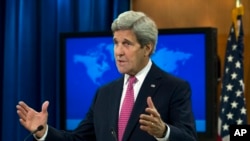The 2015 Country Reports On Human Rights Practices, issued by the State Department in mid-April, saw the continuation of a disturbing trend—that of tightening of restrictions on civil society and private citizens, particularly journalists and voices of the opposition.
“In every part of the world, we see an accelerating trend by both state and non-state actors to close the space for civil society, to stifle media and Internet freedom, to marginalize opposition voices, and in the most extreme cases, to kill people or drive them from their homes,” wrote Secretary of State John Kerry in the Report’s introduction.
The Report noted that a number of authoritarian governments attempted to stifle civil society and activists both through harassment, intimidation, detention, and restrictions on their ability to operate, as well as by implementing very broad counterterrorism or national security laws to control the freedom to assemble and to suppress dissent, and by increasing the bureaucratic obstacles nongovernmental organizations had to navigate.
Such governments stifle civil society because they fear public scrutiny. To justify their repressive actions, they present a variety of excuses. They may point out that civil society is not elected and is therefore not representative or accountable; that foreign NGOs undermine national sovereignty; or that regulating civil society is necessary to prevent financing of terrorism. However, such arguments become moot, according to the Report, when one realizes that civil society does not have the power to force people into obeying their decisions, and that it is influential because it reflects a grassroots need within a community.
The Report notes also that terrorist groups like Da’esh make efforts to drive off, shut down, or kill civil society activists as soon as they take control of a community. According to the Report, terrorist groups take such action because local grass-roots civil society organizations can sometimes stand up against violent extremists more effectively than a government security agency.
In his remarks at the roll out of the publication, Secretary Kerry said, “The choice some governments offer between freedom and stability is thus a false one, for freedom is the foundation for lasting stability,” Kerry concluded that “The frequently grim examples detailed in this Report strengthen our resolve to promote fundamental freedoms, to support human rights defenders, and to document and promote accountability for violations of human rights.”






